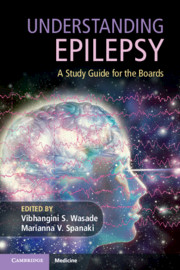Book contents
- Understanding Epilepsy
- Understanding Epilepsy
- Copyright page
- Dedication
- Contents
- Contributors
- Preface
- Chapter 1 Pathophysiology of Epilepsy
- Chapter 2 Physiologic Basis of Epileptic EEG Patterns
- Chapter 3 Pathology of the Epilepsies
- Chapter 4 Classifications of Seizures and Epilepsies
- Chapter 5 Electro-clinical Syndromes and Epilepsies in the Neonatal Period, Infancy, and Childhood
- Chapter 6 Familial Electro-clinical Syndromes and Epilepsies in Adolescence to Adulthood
- Chapter 7 Distinctive Constellations and Other Epilepsies
- Chapter 8 Seizures Not Diagnosed as Epilepsy
- Chapter 9 Nonepileptic Spells
- Chapter 10 Status Epilepticus
- Chapter 11 EEG Instrumentation and Basics
- Chapter 12 Interpreting the Normal Electroencephalogram of an Adult
- Chapter 13 Ictal and Interictal Epileptiform Electroencephalogram Patterns
- Chapter 14 Neonatal and Pediatric Electroencephalogram
- Chapter 15 Scalp Video-EEG Monitoring
- Chapter 16 Intracranial EEG Monitoring
- Chapter 17 Neuroimaging in Epilepsy
- Chapter 18 The Role of Neuropsychology in Epilepsy Surgery
- Chapter 19 Principles of Antiseizure Drug Management
- Chapter 20 Gender Issues in Epilepsy
- Chapter 21 Antiseizure Drugs
- Chapter 22 Surgical Therapies for Epilepsy
- Chapter 23 Stimulation Therapies for Epilepsy
- Chapter 24 Practical and Psychosocial Considerations in Epilepsy Management
- Chapter 25 Comorbidities with Epilepsy
- Chapter 26 System-Based Issues in Epilepsy
- Index
- References
Chapter 26 - System-Based Issues in Epilepsy
Published online by Cambridge University Press: 11 October 2019
- Understanding Epilepsy
- Understanding Epilepsy
- Copyright page
- Dedication
- Contents
- Contributors
- Preface
- Chapter 1 Pathophysiology of Epilepsy
- Chapter 2 Physiologic Basis of Epileptic EEG Patterns
- Chapter 3 Pathology of the Epilepsies
- Chapter 4 Classifications of Seizures and Epilepsies
- Chapter 5 Electro-clinical Syndromes and Epilepsies in the Neonatal Period, Infancy, and Childhood
- Chapter 6 Familial Electro-clinical Syndromes and Epilepsies in Adolescence to Adulthood
- Chapter 7 Distinctive Constellations and Other Epilepsies
- Chapter 8 Seizures Not Diagnosed as Epilepsy
- Chapter 9 Nonepileptic Spells
- Chapter 10 Status Epilepticus
- Chapter 11 EEG Instrumentation and Basics
- Chapter 12 Interpreting the Normal Electroencephalogram of an Adult
- Chapter 13 Ictal and Interictal Epileptiform Electroencephalogram Patterns
- Chapter 14 Neonatal and Pediatric Electroencephalogram
- Chapter 15 Scalp Video-EEG Monitoring
- Chapter 16 Intracranial EEG Monitoring
- Chapter 17 Neuroimaging in Epilepsy
- Chapter 18 The Role of Neuropsychology in Epilepsy Surgery
- Chapter 19 Principles of Antiseizure Drug Management
- Chapter 20 Gender Issues in Epilepsy
- Chapter 21 Antiseizure Drugs
- Chapter 22 Surgical Therapies for Epilepsy
- Chapter 23 Stimulation Therapies for Epilepsy
- Chapter 24 Practical and Psychosocial Considerations in Epilepsy Management
- Chapter 25 Comorbidities with Epilepsy
- Chapter 26 System-Based Issues in Epilepsy
- Index
- References
Summary
Individuals with epilepsy, and their family and friends, are impacted by system-based barriers arising from public policies, affecting their quality of lives. Policies on driving, education, employment, ethics, and research are widespread, and often lead to unwarranted complications.
- Type
- Chapter
- Information
- Understanding EpilepsyA Study Guide for the Boards, pp. 463 - 467Publisher: Cambridge University PressPrint publication year: 2019

